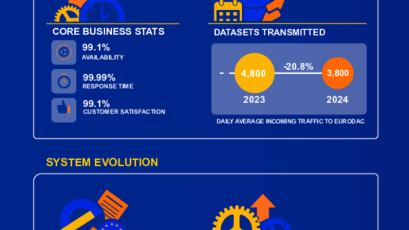Actions

Strengthening Europe’s Internal Security, Borders and Digital Resilience
From 1 July to 31 December 2025, Denmark holds the Presidency of the Council of the European Union, guiding the EU through a time of complex security challenges and significant policy implementation. Under the headline “A Strong Europe in a Changing World”, the Danish Presidency places a strong emphasis on Justice and Home Affairs (JHA) – reinforcing internal security, controlling irregular migration, boosting law enforcement capabilities, and safeguarding democratic values.
Priorities in the Justice and Home Affairs Domain
The Presidency outlines a clear set of priorities in the JHA field:
Combating irregular migration, with an emphasis on implementing the EU Pact on Migration and Asylum, enhancing return procedures, and securing the EU’s external borders through systems such as the Entry/Exit System (EES).
Fighting organised and serious crime, including drug trafficking, firearms offences, and corruption, while improving judicial cooperation with third countries.
Addressing the criminal misuse of digital technologies, including finalising work on the Child Sexual Abuse Regulation and enhancing law enforcement access to essential digital data.
Advancing the interoperability and implementation of large-scale IT systems, vital to a functioning Schengen area and effective border management.
Promoting fundamental rights, victim protection, and closer civil and judicial cooperation across borders.
Reinforcing the EU’s resilience to hybrid threats, terrorism, and future crises, with attention also on critical infrastructure and data security.
These policy directions reflect the Danish Presidency’s commitment to a secure, rules-based European Union that can respond decisively to cross-border threats.
eu-LISA’s Role: Turning Policy into Operational Capability
eu-LISA, the European Union Agency for the Operational Management of Large-Scale IT Systems, plays a central role in enabling many of the Danish Presidency’s JHA priorities to be delivered in practice. Over the next six months, the Agency will:
Support implementation of the Migration and Asylum Pact by ensuring the development and preparedness of systems such as Eurodac, EES, and ETIAS.
Lead technical preparations for EES go-live in October 2025, including testing, training and coordination with Member States and stakeholders.
Ensure seamless interoperability of EU systems to enable fast, secure data exchange between border guards, police, and judicial authorities.
Continue reinforcing cybersecurity and operational resilience in alignment with the broader EU security agenda.
In direct support of the Danish Presidency’s priority to prevent irregular migration, eu-LISA is currently working intensively with Member States on the implementation of the new Eurodac system. This enhanced system will serve as a key tool in managing irregular migration, by improving data quality, identification and tracking mechanisms across the EU.
In the area of law enforcement cooperation, eu-LISA is delivering major components of the EU’s new interoperability framework. The introduction of Multiple Identity Detection (MID) processes and further improvements to data access will provide national authorities with faster and more accurate tools for identifying individuals and detecting fraud. In addition, the Prüm II router, being developed by the Agency, will allow for automated and efficient exchange of biometric and other data between national law enforcement databases – further strengthening cross-border crime prevention and investigation.
Building a Safer and More Resilient Europe
By providing the digital foundations for Europe’s border management, security and justice cooperation, eu-LISA is directly contributing to the EU’s strategic resilience. As Denmark advances key policy goals in the area of Justice and Home Affairs during its Presidency, eu-LISA remains a committed operational partner, ensuring that the necessary systems are delivered on time, secure, and ready to support a safer and more united Europe.


